“Just what I said,” grumbled Greg. “Some of the fellows on the Army nine expect two men who are not above the average to win the whole game.”
From all private and newspaper accounts many of the West Point fans were inclined to the belief that the Navy outpointed the Army in the matter of battery. It had been so the year before when, as readers of “Dave Darrin’s Third Year At Annapolis” will recall, the Navy had succeeded in carrying the game away with neatness and despatch.
“You young men have simply got to hustle and keep cool. That’s all you can do,” urged Lieutenant Lawrence. “We haven’t had so good a nine in years. Whatever you do, don’t lie down at the last moment, and give up to the Navy the only game of the year that is really worth winning.”
Then came two hard afternoons of practice. Every onlooker watched Dick and Greg closely, anxious to make sure that neither young man was going stale.
With each added hour it must be confessed that anxiety at West Point rose another notch.
Then came the day of the game. Even the tireless and merciless instructors over in the Academic Building eased up a bit on the cadets that day, if ever the instructors did such a thing.
The Annapolis nine arrived before one o’clock and was promptly taken to dinner.
All that forenoon, the factions had been gathering.
Most of the visitors, to be sure, came to “root” for the Army, though there were not wanting several good-sized crowds that came to cheer and urge the Navy young men on to victory.
By noon there were three thousand outsiders on the West Point reservation. Afternoon trains, stages and automobiles brought crowds after that. By three o’clock everyone that expected to see the game had arrived. There were now nine thousand people on the grandstands and along the sides.
“Nine?” repeated Durville in the dressing room, when the word was brought to him. “Five thousand used to be about the usual crowd, I believe. Old ramrod, you and Holmesy are surely responsible for the other four thousand. Darrin and Dalzell can’t have done it all, for the Navy always travels light on baggage when headed this way. Yes, you and Holmesy have dragged the crowd in.”
“Quit your joshing,” muttered Greg, who was bending over his shoe laces.
“Yes; cut it. We can stand it better after the game,” laughed Dick.
“Get your men out in five minutes more, Durville,” called Lieutenant Lawrence, looking in. “The Navy fellows have been on the field ten minutes already. You want to limber up your men a bit before game is called.”
Already the sound had reached dressing quarters of the visiting fans cheering for the Navy.
In three minutes more the cheering ascended with four times as much volume, for now Durville marched the picked Army nine on to the field, and the fans on the stands caught sight of these trim young soldiers.




